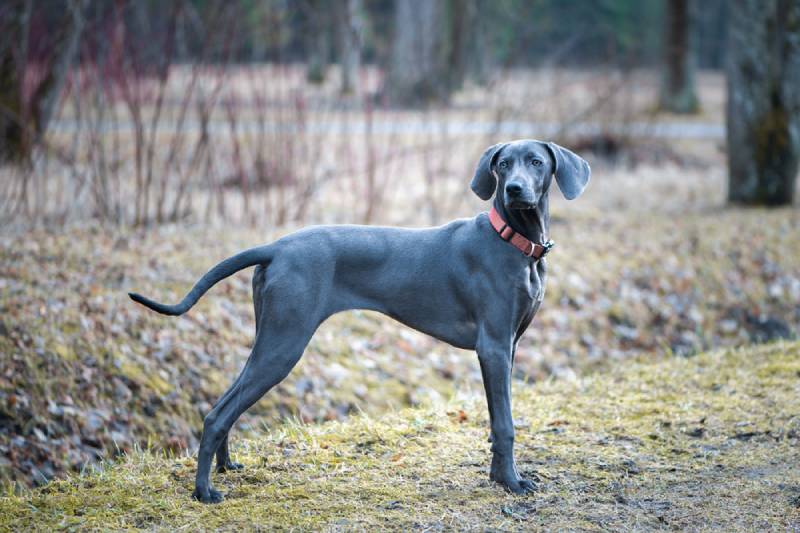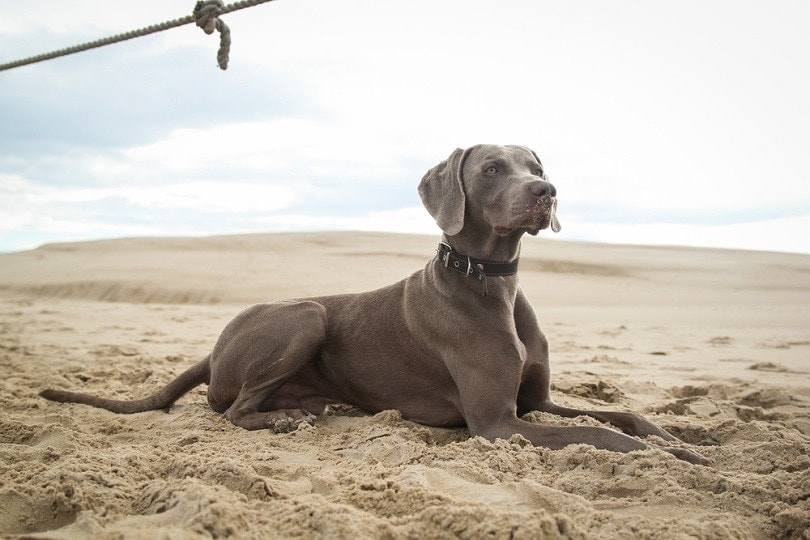Are Weimaraners More Aggressive Than Other Dogs? Temperament & Traits
Updated on

Certain breeds of dogs have a bad rep when it comes to aggression. Just the mention of their name is enough to have people raising their eyebrows and jumping to conclusions. There may be a grain of truth in this but the greater truth is that even the most placid dog has the potential to become aggressive in a particular situation. As inherently good-natured, Weimaraners are no exception.
Unfortunately, certain breeds earn a reputation for being menacing and lethal. It’s usually through no fault of their own, but rather due to the actions of people capitalizing on certain of their physical and genetic traits. They are thrust into situations where it becomes necessary for them to behave in that manner and they do not disappoint.
But how about the Weimaraner, mystically nicknamed the silver ghost? The athletic build, assertive stance and icy, piercing eyes are enough to stop you in your tracks. But is caution warranted?
Well, with any unknown dog, regardless of breed or size, it is prudent to exercise caution if you decide to approach them. But the happy reality is that Weimaraners are not one of those breeds of dogs that have a reputation for being aggressive towards people under normal circumstances.
Where Did The Weimaraner Originate?
The Weimaraner is a German hunting dog originally bred in the early 19th century by Weimar nobility for big game hunting. With the decline of this practice in the 20th century, they were used for bird hunting, at which they excelled.
The breed was created by crossing Bloodhounds with certain French and German hunting dogs such as the Great Dane and the Huehnerhund. The latter is probably responsible for the Weim’s ethereal coloring.

Weimaraner Personality and Characteristics
Once you have known and loved a Weim, you will be drawn to them forever. They are loyal, obedient and intelligent hounds that are eager to please their human/s. They become very attached and devoted to their owners. Weims tend to be quite territorial over their environment and their people, and strangers are often met with suspicion until assessed to be non-threatening.
They are alert, athletic and powerful and have oodles of mental and physical energy which requires them to be regularly and routinely exercised. Neglecting this aspect of their upkeep may result in them developing undesirable and usually destructive habits like chewing things and ripping up the house.
Even though Weimaraners are rarely used in hunting-themed activities these days, their hunting dog ancestry persists intrinsically. Whilst they get on well with other dogs if socialized correctly from a young age, they rarely coexist peacefully in a multi-species household. Weims are formidable hunters and view cats, bunnies, reptiles and birds as fair game. In this respect, they could be viewed as aggressive towards other species.

What Would Make a Weimaraner Behave Aggressively?
So, we know that under normal circumstances, Weims are not known to be aggressive. But what circumstances are not normal? As mentioned, any dog (indeed, any animal including humans) has the potential to behave aggressively if the conditions are right. Let’s take a look at some situations that might cause a Weim to respond with aggression.
- Territorial – We know that Weims, as a breed, tend to be quite territorial. If your Weim is behaving aggressively, you might want to initially explore this avenue as the potential cause. Thereafter steps can be taken to either rule out or remedy the behavior.
- Lack of Socialization – With all puppies, it’s important to socialize them with other dogs, humans and even other species from a young age. Failure to do this may result in them viewing these entities as unknown threats or prey. Aggressive behavior may be the ensuant response.
- Fear – In some ways, fear as a cause for aggression is partly linked to a lack of socialization—a fear of the unknown. But there are other causes such as abuse or neglect. Animals frequently behave aggressively when they are anxious or scared.
- Pain – Pain can also cause a moggie to behave aggressively. Just think about how grumpy you get when you have a headache! Crankiness is not uncommon in geriatric Weims that often have to contend with age-related aches and pains. Pain-related aggression can also be an indicator of a serious underlying health issue. It therefore always warrants further investigation by your veterinarian.
- Behavioral Problem – Some dogs simply have inherent behavioral problems. These may be physiological in origin, or inherited. In this case, owners need to steel themselves for the long haul. Much patience and dedication are required to improve the lot of these unfortunate and unhappy hounds.

Does a Weimaraner Make a Good Family Pet?
Weims make wonderful family pets. They adore humans of all ages and form devoted bonds with their chosen ones. They are loyal and affectionate. They love to play and have a plethora of joyful energy that can keep pup-loving kids entertained for hours. Remember to teach the kids to always respect a dog’s boundaries when they are playing. For younger kids, it may be useful to formulate a simple “dos and don’ts” list that they can apply to all animals.
Weims love to be active so they make a great choice for outdoorsy, energetic families that are constantly on the go. You couldn’t ask for a better hiking or running buddy.
Their loyal and territorial nature means that they can make very good watchdogs. Care should be taken with their training if it is the intention that they fulfil this dual purpose. This is so that they do not become aggressively territorial. The key is consistent behavior, clear instructions and firm boundaries.

What To Do If Your Weimaraner Begins to Behave Aggressively
Signs of aggressive behavior are not always obvious. We all can recognize growling, snarling, snapping and biting to be signs of aggression in dogs. However, other aggressive behaviors may precede or even replace these.
If you notice your Weim staring at someone or something for prolonged periods, or if its body, neck and head stiffen these could be early signs of aggression. The Weim may stand over other dogs or attempt to do so with certain people, or, place a paw on these. This could be dominant aggressive behavior. But it could also be clingy attention-seeking so some judiciousness is required when interpreting your canine’s behavior!
If your Weim has become aggressive, the first step is to acknowledge responsibility for it and take steps to remedy or manage it. This might initially entail supervising the unpredictable hound at all times, possibly even isolating it until its aggression can be predicted or preferably curtailed. This is for the safety of other people and animals.
At the same time, it is highly advisable to immediately consult with a canine behavioral specialist who will be able to assist. They will determine the root cause of the aggression—if this is uncertain—and formulate a management plan for remediation.
If you already know what the aggressive Weim’s triggers are, then take all steps to ensure that it is not exposed to these. This is sometimes easier said than done, unfortunately, as the trigger may be a family member or similar household fixture.
Appropriate and good behavior should be rewarded and reinforced so that the Weim clearly understands what is acceptable. In many instances, the likelihood of aggressive behavior ever developing can be minimized by early and continued regular socialization and obedience classes.

 In Conclusion
In Conclusion
Weimaraners are affectionate and loyal moggies that form devoted bonds with their humans of all ages. Although they are not naturally aggressive, it is always wise to treat all strange dogs with deference until they are familiar with you and vice versa. Although not aggressive towards humans, it is wise not to test them with different species. There’s a very good chance that their overactive prey drive will kick into action instinctively.
Because they can be quite territorial, they will be wary of newcomers to their home and around their human/s. A Weimaraner owner must be aware of this and should display situational confidence around their Weim to reassure it that everything is under control. This is not so much to prevent aggressive behavior but more to prevent anxiety.
All dogs have the propensity to be aggressive, but some, such as the Weimaraner, require severe provocation and a very real reason before they become so. The responsibility lies with us humans to ensure that this doesn’t happen.
See also:
Featured Image Credit: WildStrawberry, Shutterstock










